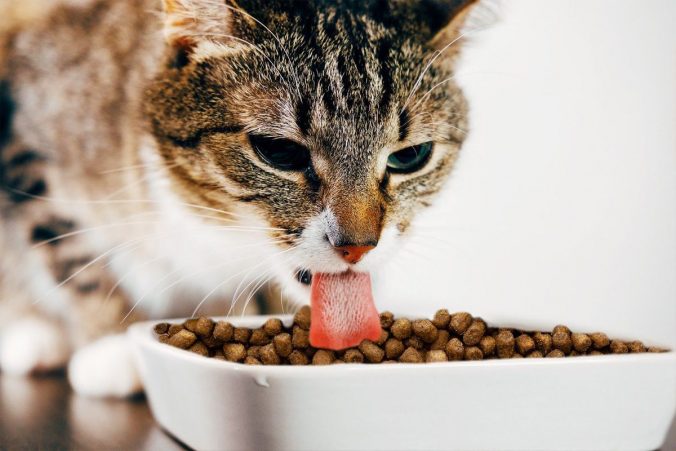Cats have different nutritional requirements than dogs because of their smaller size and shorter life span. They also tend to be less active than larger breeds so it’s important that you keep them well-fed but not over-weighted with food.
Your cat should get at least one ounce per pound of bodyweight every day. This can vary depending on age: kittens require around two ounces daily; adult cats usually need three to four ounces. If your cat has trouble eating due to illness or injury, give him extra helpings as needed. Keep reading to find out the answers to the most frequently asked questions about cat diets.
How much protein does my cat need?
A good rule of thumb for most pets is 1/3 cup dry food equals 3 cups wet food. So an average 10 lb cat would need 30 ozs of dry food and 60 ozs of water each day. That means he’d need 2 lbs of meat, 4 lbs of fish, 6 eggs, or 12 chicken breasts. The best way to find out exactly what your cat eats is to take his current diet into consideration when choosing new foods.
If your cat doesn’t like any particular type of animal product, try switching up brands until you find something she likes better. Or look for products made from natural ingredients such as soybeans, wheat gluten, and cornmeal instead of grains containing added vitamins and minerals.
Is my cat overweight?
The easiest way to tell whether your cat is too heavy is to measure her waist circumference. A measurement between 13″ and 14″ indicates normal weight while anything above 16″ may indicate obesity. Your vet will likely recommend weighing your cat periodically throughout its lifetime to ensure proper nutrition.
Can I feed my cat raw meat?
While some people think this is cruel, it actually makes sense since many animals naturally prefer uncooked meats. But don’t expect your cat to enjoy eating bones and gristle! Raw meat contains high levels of bacteria which could cause serious health problems. Instead, choose ground beef or other cooked cuts of meat.
Are canned foods safe for my cat?
Yes, especially those labeled “complete.” These contain everything necessary for a balanced meal including proteins, carbohydrates, fats, fiber and essential vitamins and minerals. Canned foods often come in easy-to-open cans, making feeding time easier. And unlike dried kibble, canned foods won’t go bad quickly once opened.
Do I really need to supplement my cat’s diet?
It depends on where your cat lives. Cats who live outdoors typically receive adequate amounts of vitamin D through exposure to sunlight. However, indoor cats living near windows may benefit from adding supplements. Vitamin E helps protect against oxidative stress caused by free radicals produced during metabolism. Omega fatty acids improve skin condition and coat quality, helping prevent hair loss and dandruff. Some commercial formulas include these beneficial compounds.
What do I use to clean my cat’s litter box?
Litter boxes aren’t meant to last forever, so keep them clean with either unscented baking soda and vinegar or white distilled vinegar diluted 50% with warm water. Scrubbing the surface regularly prevents odor buildup and keeps waste from being tracked outside. For stubborn stains, sprinkle baking powder over the area before scrubbing.
I’m concerned that my cat isn’t drinking enough water. How can I fix this problem?
Cats have special glands located behind their ears called Jacobson’s organs that secrete moisture onto fur. When the weather gets hot, cats lose fluid through perspiration and panting. To avoid dehydration, provide plenty of fresh cool water. Keep bowls filled with cold tap water and place them next to bedding areas where your cat sleeps. You might also consider using ice cubes in the freezer to chill water bottles.
My cat seems sickly. What else can I do to help?
Many illnesses affect both humans and dogs, but not cats. They’re less susceptible than we are because they lack our immune system. Still, certain conditions can lead to feline diseases just like human ones.
How much should my cat weigh?
Most veterinarians agree that adult cats shouldn’t exceed 12 pounds unless they’ve been diagnosed as overweight. This guideline was developed based on studies showing that larger breeds tend to gain weight faster than smaller ones. It’s important to monitor your cat’s body mass index. BMI measures fat content relative to height and ranges from 0 to 40. An ideal value would fall within 20 to 25.
Is my cat old enough to eat dry food?
Dry food lasts longer than wet food does and therefore requires fewer meals per day. Dry food comes in two forms: whole grain and semi-moistened. Whole grain varieties usually offer better nutritional benefits and lower calorie counts compared to moistened versions. Semi-moisturized products require slightly higher maintenance due to increased humidity. Both types of dry food must always be refrigerated.
Should I switch to an organic formula?
Organic cat foods are made without any artificial ingredients such as corn syrup, soybean oil, or wheat flour. While most conventional brands are fortified with added vitamins and minerals, organics are required to meet strict standards set by USDA regulations. Organic options are available in select stores nationwide.




